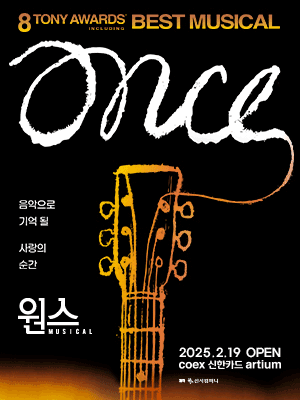Once

I went to the show in May 2025 in Korea. I liked the simple Irish bar stage with lots of old, dusty frames on the wall, just like a real Irish pub. I thought they could have hung cups and kettles from the ceiling to enhance the atmosphere, but I guessed the Korean licensed production followed the original set.
Thirty minutes before the show, the stage pub entertained the audience, who could buy drinks like at a real bar. Ten minutes before the show, the actors started playing guitar, violin, viola, mandolin, accordion, cajón, piano, and more. They sang in a language unfamiliar to me — probably Czech. The engaging folk music made heavy use of foot stomping, raising the atmosphere to prepare for the show, which started seamlessly with an older actor’s solo followed by the Guy’s lament about his girlfriend leaving for New York. I noticed the hall’s acoustics were very dry with little reverb. At first, I couldn’t catch the lyrics clearly and had to concentrate more. The sound itself was clear, almost like voices and accompaniment without amplification. With about a 1,000-seat theater, it was a good choice not to amplify too much, but a slight increase in volume would have been better. Reverb and volume increased effectively when the Guy sang into a standing microphone, probably to emphasize moments like a broadcast or club performance within the musical.
Somewhere in the middle, I saw a ukulele cutely played in the background and heard a pipe-like resonance. I kept looking for a pipe instrument, but it turned out to be a banjo, according to my friend ChatGPT, which provided a deeper dimension to the band’s color.
The Girl’s accent, as a Czech character, was marked by a foreigner’s Korean. When she was supposed to speak Czech, she used perfect Korean pronunciation. The other roles followed a similar approach to distinguish their "English" and "Czech," though both were spoken in Korean. When mimicking English, the Girl had humorous dialogue and enunciated differently from the original punctuation, adding more energy to the lines. I think the translation team did a very good job, though "Falling Slowly" sounded unnatural with Korean lyrics — unavoidably different from the Grammy-winning song’s original words. Still, it was good when the Guy and Girl sang it, followed by the other actors joining in with instruments.
The Girl’s determination and firm belief that the Guy’s music would succeed commercially was beautiful, though I admit I wouldn’t be brave enough to invest in an almost stranger so easily. I must be a coward. Since the musical is light-hearted and optimistic, even the bank loan manager — who pretended to be a bad singer — played the guitar beautifully, earning big applause from the audience. I liked this scene a lot. The Girl’s speech about Ireland — a small island in the Atlantic Ocean with a strong cultural heritage including writers like W. B. Yeats, Samuel Beckett, James Joyce, and Oscar Wilde — was formidable. Bono was mentioned earlier in the musical, but besides him, Ireland also has Sinéad O'Connor, Van Morrison, Hozier, and more! I could have given a standing ovation right there.
In Act II, an argument between the pub owner and the banker led the Guy and Girl to a nearby hill. The Guy shared his childhood memories of his mother encouraging him to step into the world to accomplish something. The Girl talked about her husband, who had left her and their daughter in Dublin to return to the Czech Republic. The Guy’s feelings grew clearer, while the Girl confessed her emotions in Czech but kept them hidden otherwise.
"When Your Mind’s Made Up" brought a surge of energy to the scene. The engineer, who had been quietly observing, finally gave an approving nod. It reminded me of the subtle smile from the movie’s engineer — a small gesture, but one that carried great weight. In that moment, it became clear that the Girl’s belief in the Guy’s music had been right all along. His passion and persistence had paid off, and together, they had created something worth noticing. The entire band seemed to sense the breakthrough, their performance gaining confidence and momentum.
Eventually, the stage left the Girl alone, playing the piano and repeating a song with changed lyrics that signaled the approaching end of their relationship — that never even fully began. The Guy listened to her song and asked her to come to New York, but she refused. She was married with a child and wanted to give her husband a second chance. The Guy, aware of his growing love for her but uncertain if his feelings for his ex-girlfriend had fully ended, accepted the reality. This might be a small plot obstacle in typical musicals, but in real life, it would lead to lawsuits and complications. The story either reflects real-life struggles or shows that their attraction wasn’t strong enough to forget reality — or perhaps they were too mature to ignore it. Either way, it leaves lingering thoughts of what might have been, which is exactly the lasting impression the story needs.
The show ended with a duet reprise of "Falling Slowly," with the two singing on the same stage but now likely in different cities — the Guy in New York and the Girl in Dublin with her new piano.
I have Dublin in my heart. I had chances to visit the city for work. Its low, well-preserved buildings contrast with the taller Guinness building. I wandered among pubs at Temple Bar, intending to have just one pint in each. At the third pub, I met a married Irish couple who asked me to join them. My mission was incomplete, but I experienced Irish hospitality. My colleagues once visited the guitar shop from the Once movie and even bought guitars as souvenirs — perhaps too large to carry easily. This personal nostalgia added warmth to my experience of the musical.